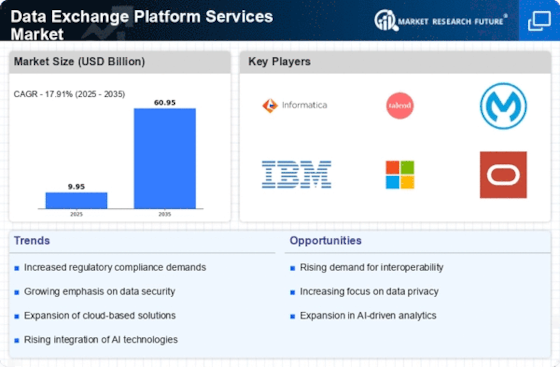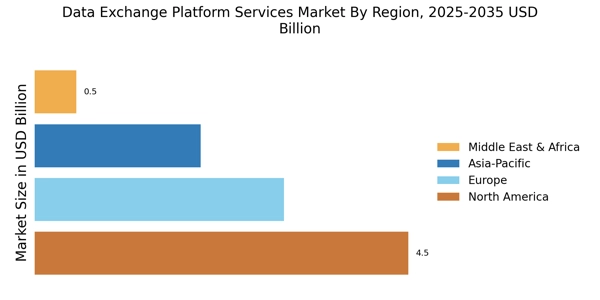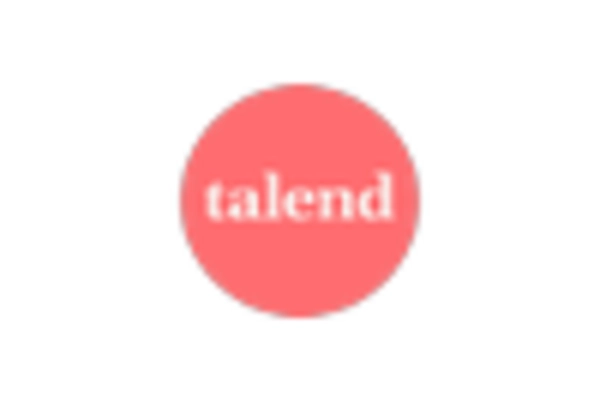Emphasis on Data Governance
In the Data Exchange Platform Services Market, there is a pronounced emphasis on data governance as organizations seek to ensure data quality and compliance with regulatory standards. The increasing complexity of data management, coupled with stringent regulations such as GDPR and CCPA, has led companies to prioritize governance frameworks. This focus on governance is expected to drive investments in data exchange platforms that offer robust compliance features. Market analysis suggests that the data governance market could reach USD 5 billion by 2025, reflecting the critical role of governance in the data exchange landscape. Consequently, the Data Exchange Platform Services Market is likely to expand as organizations adopt solutions that enhance their governance capabilities.
Growth of Cloud-Based Solutions
The Data Exchange Platform Services Market is witnessing significant growth due to the increasing adoption of cloud-based solutions. Organizations are migrating to cloud environments to leverage scalability, flexibility, and cost-effectiveness. This shift is particularly relevant as businesses seek to enhance their data exchange capabilities without the burden of extensive on-premises infrastructure. Recent data indicates that the cloud services market is expected to surpass USD 500 billion by 2025, underscoring the potential for data exchange platforms that operate in the cloud. As more companies transition to cloud-based models, the Data Exchange Platform Services Market is poised for substantial growth driven by this technological evolution.
Rising Need for Data Integration
The Data Exchange Platform Services Market is experiencing a notable rise in the need for seamless data integration across various sectors. Organizations are increasingly recognizing the importance of integrating disparate data sources to enhance operational efficiency and decision-making. This trend is driven by the growing volume of data generated from multiple channels, necessitating robust platforms that can facilitate real-time data exchange. According to recent estimates, the data integration market is projected to reach USD 10 billion by 2026, indicating a strong demand for services that enable effective data sharing. As businesses strive to remain competitive, the Data Exchange Platform Services Market is likely to see accelerated growth fueled by this integration imperative.
Demand for Real-Time Data Processing
The Data Exchange Platform Services Market is increasingly driven by the demand for real-time data processing capabilities. Organizations are recognizing the value of timely data insights for making informed decisions and responding swiftly to market changes. This trend is particularly evident in sectors such as finance and healthcare, where real-time data can significantly impact operational outcomes. Market projections suggest that the real-time data processing market could reach USD 8 billion by 2026, highlighting the urgency for platforms that can facilitate immediate data exchange. As businesses prioritize agility and responsiveness, the Data Exchange Platform Services Market is likely to expand in response to this growing demand.
Emergence of Artificial Intelligence and Machine Learning
The Data Exchange Platform Services Market is experiencing a transformative shift with the emergence of artificial intelligence (AI) and machine learning (ML) technologies. These advancements are enabling organizations to automate data exchange processes, enhance data analytics, and improve decision-making. The integration of AI and ML into data exchange platforms is expected to drive innovation and efficiency, as businesses seek to harness the power of advanced analytics. Market forecasts indicate that the AI market in data management could reach USD 15 billion by 2025, suggesting a robust growth trajectory for the Data Exchange Platform Services Market. As organizations increasingly adopt AI-driven solutions, the demand for sophisticated data exchange platforms is likely to surge.

















